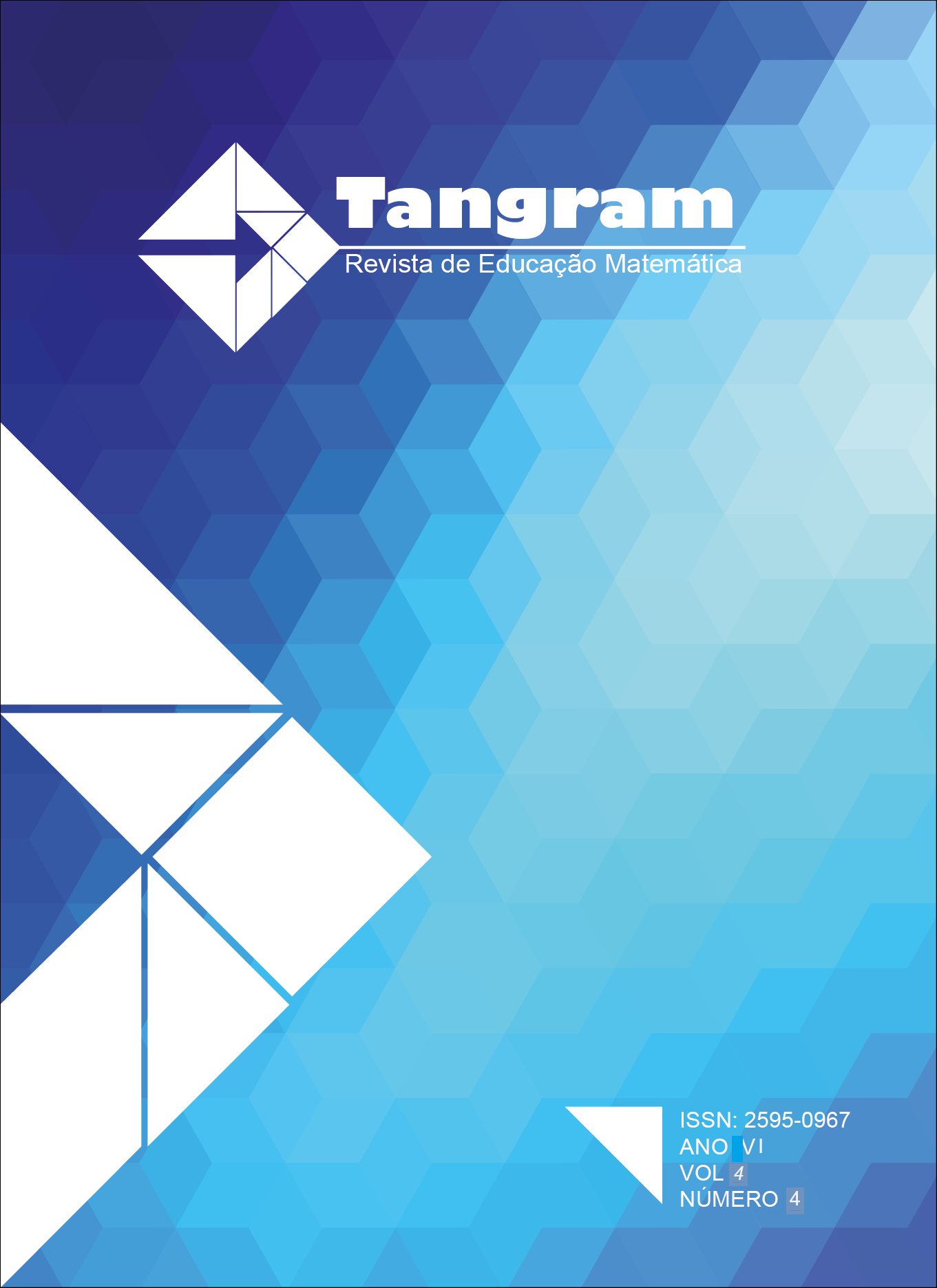Percepções de licenciandos em matemática acerca da resolução de problemas
DOI:
https://doi.org/10.30612/tangram.v6i3.17220Keywords:
Mathematics teaching, Initial trainingAbstract
The aim of this article is to analyze the perceptions of undergraduate students in Mathematics about problem solving as a methodological tendency for teaching. The records produced were in a class of the first semester of the Degree in Mathematics at a Federal University of Rio Grande do Sul, enrolled in the discipline of Introduction to Mathematics Education. These records were analyzed based on the Discursive Textual Analysis of Moraes and Galiazzi (2007). From the analysis, two categories emerged involving problem solving: potentialities and challenges. As potentialities stand out understandings and perceptions of teachers; elaboration of problems and pedagogical mediation and initial training, already as challenges to break with traditional teaching; Mathematics learning and the particularities of students. Finally, it is highlighted that the resolution of problems permeating the initial training is fundamental for the undergraduates to be able to appropriate and, therefore, take it to the pedagogical practice.
Downloads
References
Alro, H., & Skovsmose, O. (2010). Diálogo e aprendizagem em Educação Matemática. Belo Horizonte: Autêntica.
Barato, M. N., Silva, M., & Machado, L. B. (2022). Aprendizagem Significativa e a formação de professores. Revista Paranaense de Educação, 11 (24), 376-394.
Barreto, M. das G. B., & Prado, M. E. B. B. (2018). Um diálogo sobre práticas na formação dos professores que ensinam matemática. TANGRAM - Revista de Educação Matemática, 1(2), 39–58.
Brasil. (2022). Índice de desenvolvimento da educação básica. Recuperado de https://www.gov.br/inep/pt-br/areas-de-atuacao/avaliacao-e-exames-educacionais/saeb/resultados
Brasil. (1998). Parâmetros Curriculares Nacional. Matemática. Brasília: MEC.
Brasil. (2018). Base Nacional Comum Curricular. Recuperado de http://basenacionalcomum.mec.gov.br/
Felcher, C. D. O., & Folmer, V. (2021). O uso de tecnologias digitais no ensino de Matemática. Ijuí: Unijuí.
Gatti, B. A., & Barreto, E. S. S. (2009). Professores: aspectos de sua profissionalização, formação e valorização social. Brasília: UNESCO.
Lüdke, M., & André, M.E.D.A. (1986). Pesquisa em Educação: abordagens qualitativas. São Paulo: Editora Pedagógica e Universitária.
Moraes, R., & Galiazzi, M. C. (2007). Análise textual discursiva. Ijuí: Unijuí.
Onuchic, L. R. (1999). Ensino-aprendizagem de Matemática através da resolução de problemas. In: Bicudo, M. A. V. (Org.). Pesquisa em educação Matemática. São Paulo: Editora UNESP.
Onuchic. L.R., & Allevato, N. S. G. (2011). Pesquisa em resolução de Problemas: caminhos, avanços e novas perspectivas. In: Boletim de Educação Matemática (BOLEMA),UNESP–IGCE, 5(41).
Onuchic, L. R., & Allevato, N. S. G. (2012). Novas reflexões sobre o ensino-aprendizagem de Matemática através da resolução de problemas. In: Bicudo, M. A. V.; Borba, M. C. Educação Matemática: pesquisa em movimento. São Paulo: Cortez.
Ponte, J. P., Brocardo, J., & Oliveira, H. (2013). Investigações Matemáticas na Sala de Aula. Belo Horizonte: Autêntica.
Proença, M. C., & Maia-Afonso, É. J. (2020). Resolução de problemas: análises de propostas de ensino em dissertações de mestrado profissional. Revista Paranaense de Educação Matemática, 9(18),180–201.
Ravagnani, J. A. D. C., & Marques, A. C. T. L. (2017). George Polya e ensino de Matemática por meio da Resolução de Problemas nas Diretrizes Curriculares Nacionais para a formação de professores de Matemática. Posgere, 1, 30-53.
Romanatto, M. C. (2012). Resolução de problemas nas aulas de Matemática. Revista Eletrônica de Educação: Programa de Pós-Graduação em Educação, São Carlos, 6, 299-311.
Schroeder, T. L., & Lester, F. K., JR. (1989). Developing understanding in mathematics via problem solving. In: Trafton, P. R. & Shulte, A. P. (Eds.). New directions for elementary school mathematics. (pp. 31-42) Reston: NCTM.
Selbach, S. (2010). Matemática e didática. Petropólis: Vozes.
Van de Walle, J. A. (2009). Matemática no ensino fundamental: formação de professores e aplicação em sala de aula. Porto Alegre: Artmed.
Downloads
Published
How to Cite
Issue
Section
License

This work is licensed under a Creative Commons Attribution-NonCommercial-ShareAlike 3.0 Unported License.
Authors must accept the publication rules when submitting the journal, as well as agree to the following terms:
(a) The Editorial Board reserves the right to make changes to the Portuguese language in the originals to maintain the cultured standard of the language, while respecting the style of the authors.
(b) Authors retain the copyright and grant the journal the right to first publication, with the work simultaneously licensed under the Attribution-NonCommercial-ShareAlike 3.0 Brazil (CC BY-NC-SA 3.0 BR) that allows: Share - copy and redistribute the material in any medium or format and Adapt - remix, transform, and create from the material. CC BY-NC-SA 3.0 BR considers the following terms:
- Attribution - You must give the appropriate credit, provide a link to the license and indicate whether changes have been made. You must do so under any reasonable circumstances, but in no way that would suggest that the licensor supports you or your use.
- NonCommercial - You may not use the material for commercial purposes.
- Sharing - If you remix, transform, or create from material, you must distribute your contributions under the same license as the original.
- No additional restrictions - You may not apply legal terms or technological measures that legally restrict others from doing anything that the license permits.
(c) After publication, authors are allowed and encouraged to publish and distribute their work online - in institutional repositories, personal page, social network or other scientific dissemination sites, as long as the publication is not for commercial purposes.






